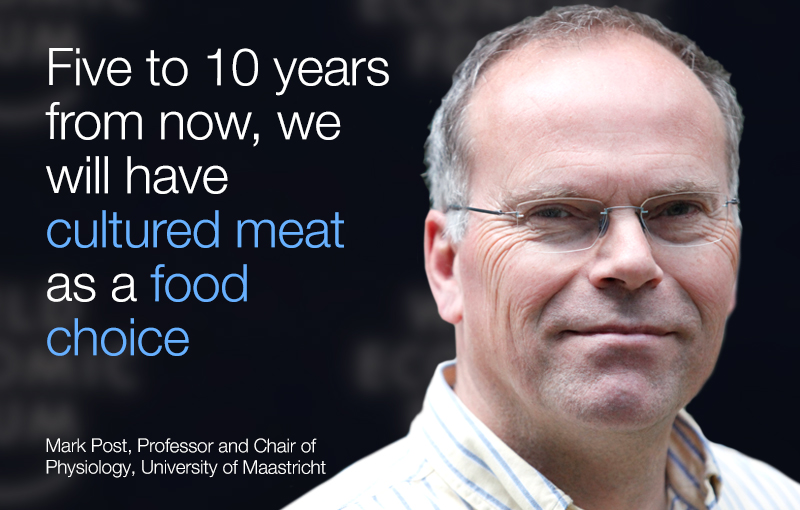What if: scientists are the new chefs?


Get involved with our crowdsourced digital platform to deliver impact at scale
Stay up to date:
Agriculture, Food and Beverage
This blog is part of a series based on the ‘What If?’ sessions taking place at the Annual Meeting of the New Champions 2015. Mark Post, Professor and Chair of Physiology, University of Maastricht, explores the possible impacts of synthetic and bio-engineered food becoming the norm
The future of food – production as well as consumption – is a hot topic. With so many threats to food security, as the world population grows and demand increases, radical innovations in comestibles are becoming more attractive and realistic.
New technologies are extending into areas beyond the traditional fields of information, transport, energy and manufacturing. But while we are curious about novel foods, this is balanced out by emotional responses based on habit, tradition and our desire to stay safe and healthy.
The discussion around food security and food quality focuses mostly on proteins as valuable and necessary constituents of our diet. Proteins – and animal proteins in particular – are expensive to produce and come with more environmental and ethical dilemmas than carbohydrates and fats.
It is commonly accepted that humans benefit from proteins, minerals and vitamins in meat, however we can live perfectly happy and healthy lives on proteins that come solely from vegetables. In a well-balanced diet, minerals and vitamins can be acquired without relying on animal derivatives.
Animal proteins can be synthesized using chemistry or biology in a variety of ways. Proteins can be synthesized chemically, through recombinant DNA technology using micro-organisms, by culturing muscle cells from varies animals, or by small animals such as insects.
These alternative sources all need to prove themselves in terms of resource and cost effectiveness. Assuming they can, the major question becomes whether the consumer is willing to embrace these novel foods. Rationally and ethically, the advantages can be easily understood and accepted – and this is also the major appeal. Emotionally however, it may prove more difficult. Are we ready for insects, cultured meat or protein drinks? What will be the decisive features of these foods that consumers seek?
Safety is on the forefront of people’s minds when novel foods are being discussed. This is logical; after all, the novel foods are highly dependent for their design and production on humans who can, and therefore will, make mistakes.
If resemblance to existing foods, or familiarity, is key to the acceptance novel foods, cultured meat may be the most promising, as it will result in the same tissue as meat. Designers continuously try to mimic the structure and taste of meat with vegetable substitutes. But it is equally likely that a departure from traditionally grown proteins will evolve into a situation where food products bear little resemblance to natural ingredients.
Although food is one area where we are slow to accept radical technologies (GMO, for instance), trends in other areas suggest that as humans, we progressively become less resistant to change. The technologies to produce synthetic food are coming over the horizon, but will consumers show the same eagerness to embrace them as they did in the digital revolution?
Author: Mark Post is Professor and Chair of Physiology, University of Maastricht, Netherlands. He will be participating at the Forum’s Annual Meeting of the New Champions, which is taking place in Dalian, China, 9-11 September.
Image: The world’s first lab-grown beef burger is seen after it was cooked at a launch event in west London August 5, 2013. REUTERS/David Parry/pool
Don't miss any update on this topic
Create a free account and access your personalized content collection with our latest publications and analyses.
License and Republishing
World Economic Forum articles may be republished in accordance with the Creative Commons Attribution-NonCommercial-NoDerivatives 4.0 International Public License, and in accordance with our Terms of Use.
The views expressed in this article are those of the author alone and not the World Economic Forum.
Related topics:
The Agenda Weekly
A weekly update of the most important issues driving the global agenda
You can unsubscribe at any time using the link in our emails. For more details, review our privacy policy.
More on Industries in DepthSee all
Robin Pomeroy
April 25, 2024
Daniel Boero Vargas and Mandy Chan
April 25, 2024
Abhay Pareek and Drishti Kumar
April 23, 2024
Charlotte Edmond
April 11, 2024
Victoria Masterson
April 5, 2024
Douglas Broom
April 3, 2024







